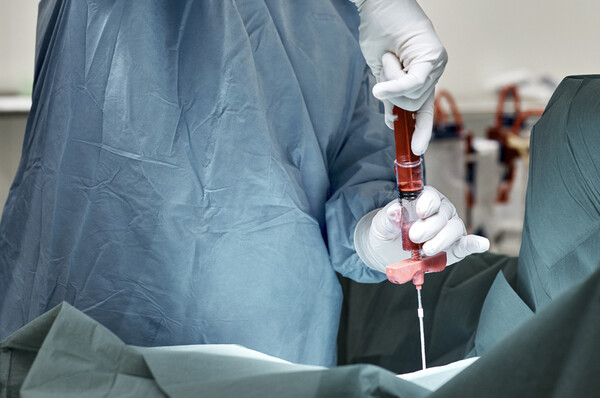
Asan Medical Center (AMC), recently fined for violating the Medical Service Act due to a nurse practitioner performing a periosteal puncture to collect bone marrow tissue instead of a doctor, has filed an appeal with the Supreme Court.
The hospital argued that the appeals court trial, which reversed the initial verdict and found the nurse guilty of unlicensed medical practice, was unjust. (Related article:Appeals court found AMC nurse practitioners guilty of conducting periosteal puncture)
However, doctors who made the accusations against AMC rebutted the hospital’s claim. They said AMC was distorting the facts in its claims of innocence. Should the Supreme Court reverse the decision and permit nurses to conduct periosteal punctures, the controversy is likely to extend to other areas of medical practice, the doctors said.
On Wednesday, the Korean Hospital Doctors Association (KHDA) released a statement in response to AMC's appeal brief submitted to the Supreme Court, countering the hospital's arguments. Back in 2018, the association filed a police complaint against AMC and its officials based on information provided by one of its members.
The association emphasized that if hospitals were to include periosteal punctures on the list of medical procedures that nurses are permitted to perform, it could potentially open the door for nurses to engage in surgeries and other invasive medical procedures as well.
"Periosteal puncture has traditionally been regarded as a medical procedure on par with surgical interventions. If the periosteal puncture is recognized as a medical task within the nurse's domain, it raises the question of whether many surgeries typically carried out by physicians in the operating room need not strictly require their involvement,” the KHDA said in the statement.
This could encompass activities such as obtaining consent or administering anesthesia, as a periosteal puncture is conducted under anesthesia with the consent of the patient or their guardian. Current legal precedents affirm that the responsibilities of obtaining consent and administering anesthesia are reserved exclusively for physicians.
Thus, if the designation allows nurses to conduct periosteal punctures, it would inevitably expand the debate to encompass numerous medical procedures traditionally carried out by physicians, potentially even encompassing "less invasive procedures than periosteal punctures, the association argued.
"The Supreme Court's ruling in this matter represents a substantial shift in the realm of medical professionals' responsibilities,” the KHDA said. “Should the Supreme Court's decision permit non-doctors to engage in practices without due caution, it is the general public that will ultimately bear the consequences."
‘Several medical errors occurred at AMC’
The association further asserted that AMC had misrepresented periosteal punctures as safe procedures devoid of side effects or complications, portraying them as suitable tasks for nurses to undertake.
"We have already documented several instances of fatal accidents following periosteal puncture procedures on the posterior superior iliac spine," stated the association. "Even when a periosteal puncture needle inadvertently affects a blood vessel or organ within the pelvic cavity, these complications can be challenging to discern with the unaided eye.”
Thus, a physician must make an accurate assessment of potential medical mishaps and respond promptly, it added.
The safety of periosteal puncture in the posterior superior iliac spine implies that it is comparatively safer than conventional sternal procedures. However, it does not negate the possibility of an accident occurring, the association clarified.
“AMC stated in its appeal that only minor accidents have occurred at the hospital. They admitted that the periosteal puncture procedure is not a perfectly safe medical practice," the KHDA said.
The assertion that the procedure was executed by an experienced oncology nurse who had never committed a medical error was also inaccurate, the association went on to say.
"The nurse practitioner program is not designed to replace physicians. It is a system for the professional development of nursing. Being a nurse practitioner does not take away from the scope of practice of a nurse,” it said.
The reasoning that the nurse who conducted the periosteal puncture was competent and did not make a medical error is analogous to the argument that illegal surrogate surgery is acceptable as long as no accidents occur, it added.
‘Illegality is not justified just because AMC does it’
The doctors' association also expressed skepticism regarding the argument that other hospitals, in addition to AMC, had delegated periosteal puncture procedures to nurses and that the medical staff was unaware of its illegality.
AMC attempted to justify its position in its appellate brief by disclosing that four other hospitals had also allowed nurses to carry out periosteal punctures. However, this argument is viewed by some as a rhetorical maneuver, suggesting that it cannot solely penalize itself without addressing the actions of other hospitals, the doctors’ group said.
According to the KHDA, all four of these hospitals transitioned to having doctors perform periosteal punctures following the allegations leveled against AMC.
"This means that the hospitals were aware that the practice was illegal. It is incomprehensible that only AMC, the top hospital in Korea, was unaware of the illegality that everyone in the medical and nursing community knew," it said.
"Nurse periosteal puncture is not justified because a large hospital like AMC does it, nor does it become legal because other hospitals do it," it added.

